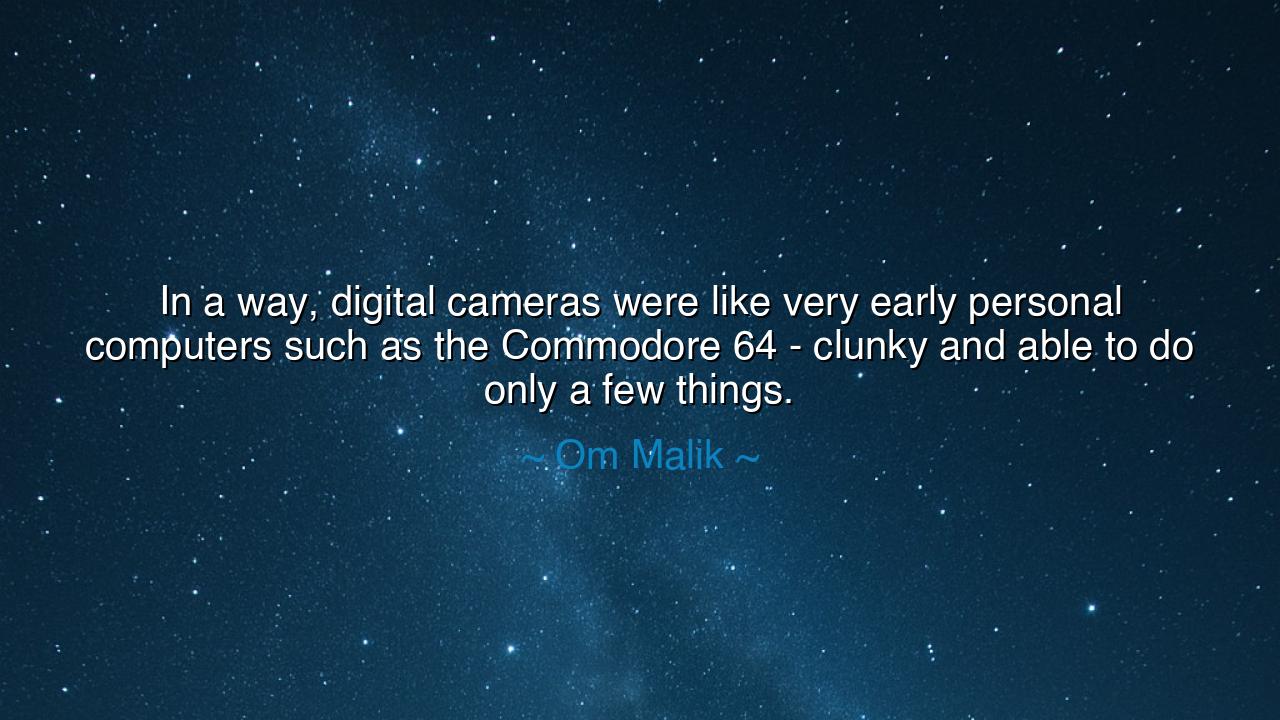
In a way, digital cameras were like very early personal computers
In a way, digital cameras were like very early personal computers such as the Commodore 64 - clunky and able to do only a few things.






In the words of Om Malik, “In a way, digital cameras were like very early personal computers such as the Commodore 64—clunky and able to do only a few things.” This comparison invites us to look back at the early days of technology and to recognize the humble beginnings from which many of our modern advancements have sprung. The digital camera, like the Commodore 64, was once a novelty, capable of performing only a fraction of what it would eventually come to do. Malik’s reflection serves as a powerful reminder that the seemingly simple tools we use today once started as rudimentary devices, full of potential yet limited by the knowledge and technology of their time.
In the ancient world, the Greeks understood that all great achievements begin with the most modest of beginnings. The philosopher Heraclitus famously said, “The road up and the road down are the same.” What he meant was that progress is a continuous journey, often marked by humble steps that lead to greatness. Just as the Commodore 64 was a primitive step toward the modern computer, the early tools of ancient times—like the wheel and written language—were the building blocks of monumental advances. These early creations were not perfect, but they laid the foundation for the wonders that would follow. Malik’s words echo this ancient wisdom: the potential for greatness resides in the seeds of simplicity.
Consider the story of Leonardo da Vinci, a man whose inventions were centuries ahead of his time. Da Vinci sketched designs for flying machines, hydraulic pumps, and early versions of what we would now call computers. Though these creations were not fully realized in his era, they were the precursors to technologies that would later change the course of history. The initial attempts may have seemed rudimentary, even clunky, but da Vinci understood that each invention, no matter how simple, was a step toward unlocking the full potential of human ingenuity. Like the Commodore 64 or the early digital cameras, these early inventions were born of curiosity and a vision of what could be, even if they could only achieve a fraction of their future promise.
This lesson is mirrored in the development of the digital camera itself. When it was first introduced, the digital camera could barely capture a fraction of the clarity and complexity of an image that we now take for granted. The first consumer-grade digital cameras were clunky, slow, and offered only limited functionality—much like the early computers that were nothing more than calculators with limited memory and primitive graphics. Yet, these early versions, for all their imperfections, set the stage for the technological marvels we now carry in our pockets—cameras that can not only take photographs but edit them, store them, and share them instantly with the world. The journey of digital technology has been one of continuous improvement, just as the advancements of the ancient world came from small steps that led to great achievements.
The lesson here is one of patience and faith in the process of creation. Malik’s quote reminds us that greatness is not born from perfection, but from humble beginnings. The early steps we take, though imperfect, are essential to the unfolding of the grander vision. Just as the Commodore 64 was limited in its capabilities, yet contributed to the evolution of the modern personal computer, so too do our early efforts—whether in technology, art, or any field—lay the groundwork for the innovations of the future. The key is to recognize that limitations today do not mean failure tomorrow.
In the same way that early inventions led to revolutionary breakthroughs, so too must we recognize the potential in our own struggles and setbacks. Each small failure or limitation is merely a stepping stone on the path to mastery. Take, for example, the story of Thomas Edison, whose countless failures in the search for the light bulb only strengthened his resolve. Edison famously said, “I have not failed. I've just found 10,000 ways that won't work.” His journey, much like the evolution of computers and digital cameras, was one of incremental progress, each step bringing him closer to the solution that would transform the world.
The lesson we can draw from Malik’s reflection is one of resilience and embracing imperfection. Do not despair at the clunkiness of your own efforts, nor should you be discouraged by the limitations of your current tools or abilities. Instead, understand that each small step forward is part of the greater journey, and that the imperfections of today will become the foundation of tomorrow’s masterpiece. Whether in technology, creativity, or life, the path to greatness is built on humble beginnings, and each step you take, no matter how small, brings you closer to your ultimate goal.






AAdministratorAdministrator
Welcome, honored guests. Please leave a comment, we will respond soon